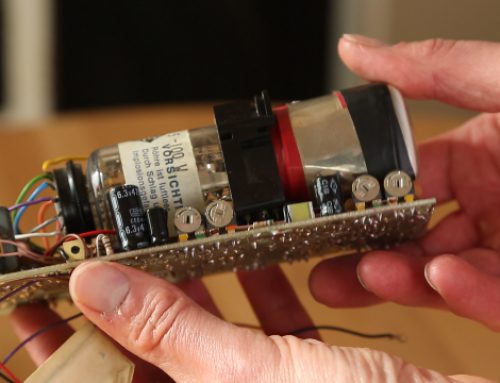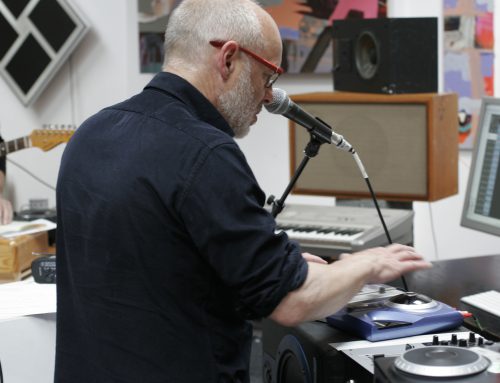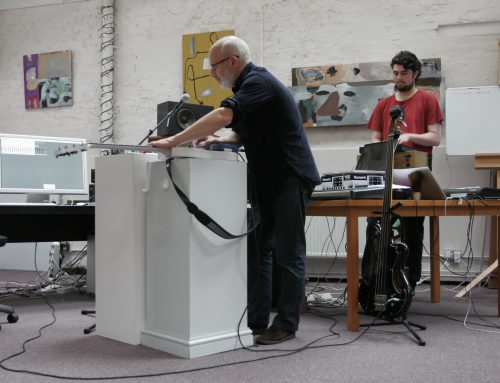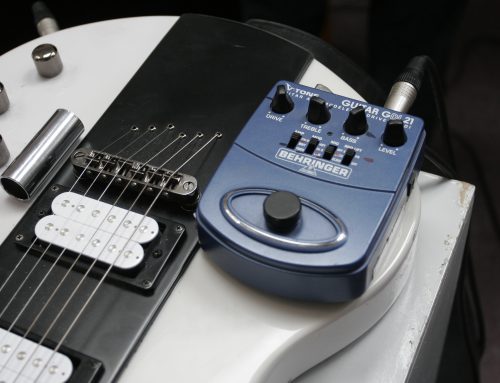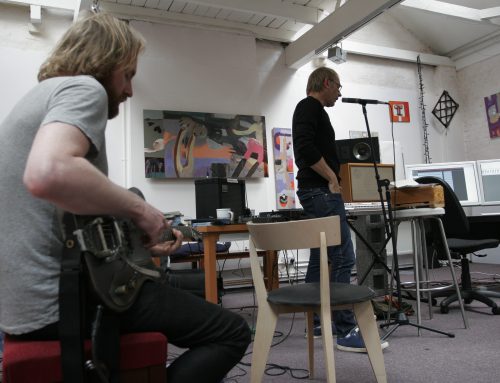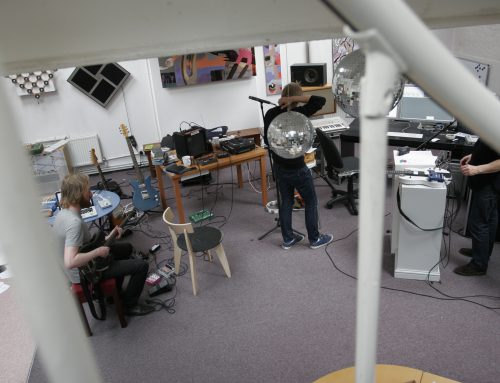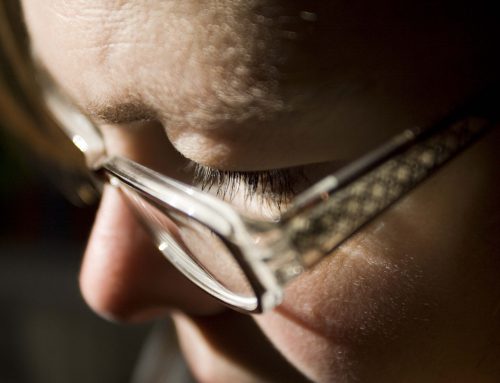Backstage at the Cambridge Junction in the summer of 1997, Kelly Jones of the Stereophonics’ gave a brief history of the band, explained their setup and revealed their hopes for the future.
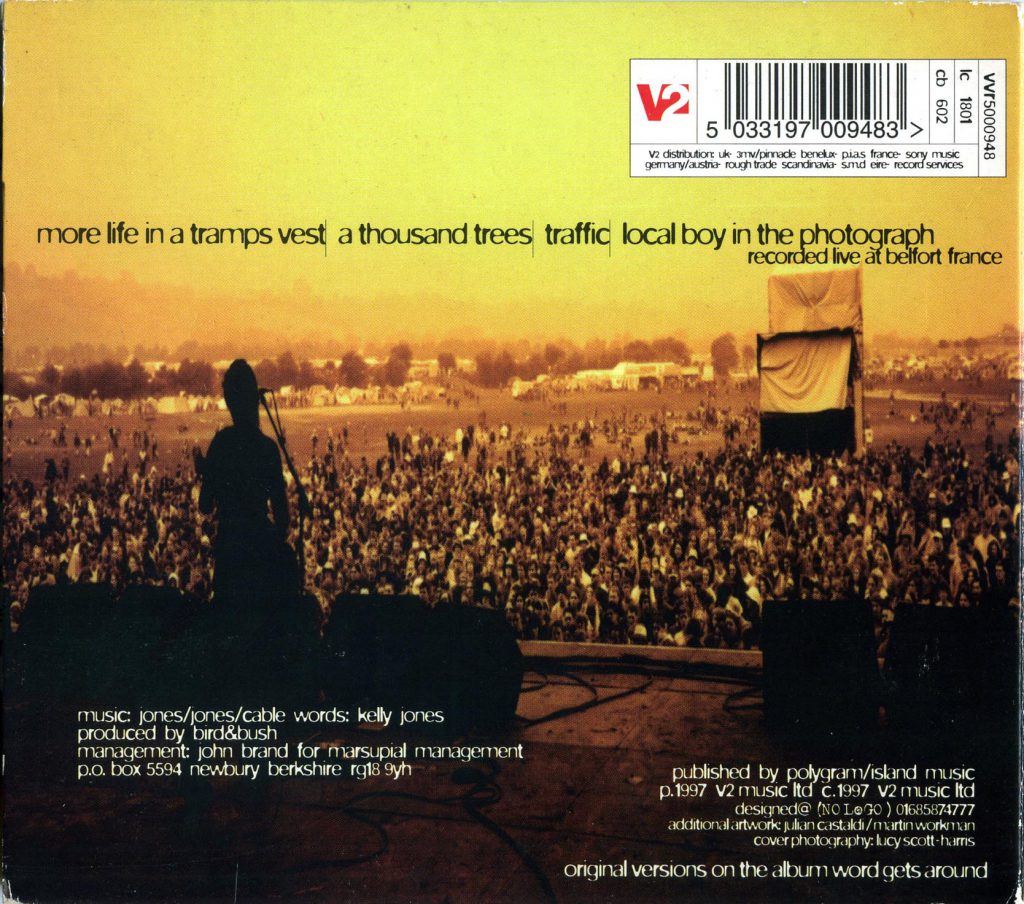
Festival EP from 1997
In 1996, the Welsh rock band Stereophonics signed a record deal with Richard Branson’s new V2 label, believing that by being the first on the roster they would be the centre of attention. Their plan proved to be a good one. V2 needed the Stereophonics to be a success in order to finance the label, so they ploughed all their efforts into promoting the band and their debut album Word Gets Around, sending them on a series of lengthy live tours.
It was some time towards the end of the summer of 1997 when I managed to arrange an interview with the band at the Junction venue in Cambridge, where they were about to play a gig. It was for a live magazine so the focus was on the band’s stage setup, but before I had a chance to attend to the text, the magazine folded and the piece was shelved.
At the time, no one could predict how successful the band would become and the venue was more than half-empty that evening. Eventually though, V2 and the band’s efforts began to pay off and so followed a series of chart-topping albums taking them to stadium rock status.
When the photographer and I arrived at the Junction on that particular evening some time in 1997, the band were just finishing their sound check and we were greeted by V2’s hugely confident Regional Promotions Manager, Andy Hipkiss, who specialized in disconcertingly firm handshakes.
A local amateur fanzine had also managed to get an interview and was represented by two eager and attractive young girls. Andy introduced us all to the band and then made a decision as to who would interview who. He assigned Kelly to me and Stuart Cable to the girls. Kelly, quite understandably, loudly voiced his disappointment, but was quickly reassured by the forthright Hipkiss that he would get the girls another time and that our magazine was the more important job.
Still protesting, Kelly accompanied us to one of the backstage rooms and, over the din of the support band (which roared into the room as venue staff blundered back and forth leaving the soundproof doors ajar as they went), I began the interview. This is it, exclusive to The Polymath Perspective.
Last year, I think you were playing at the Cambridge Boat Race…
“Yes, with AC Acoustics, I think it was.”
Now you are at the Junction. What has changed in the last year?
“We played there in November
“Empty rooms getting fuller and fuller, basically, and now they are starting to sell out, so it’s gone really well. It’s been a really busy year and I think we’ve had about three weeks off in total. It’s been good progress.”
Have things changed for you in terms of your gear and setup?
“My gear has. When we first started I just had one Peavey Bandit amplifier – an old one.
I always liked Peavey because of the sound and because it was easy to use but I don’t like the new stuff – it’s shit. But all I had was this quite old amp and you can get a lot of variation out of it.
“It was a good sound on stage but kind of thin at the front. Dave [Roden], our sound guy couldn’t get enough depth out of it so we introduced the 4×12 Fender cab just to give it a bit of bottom end.
“So I just had that [extra cab] for a bit of bottom end. But then I needed something to boost, and I don’t like overdrive pedals, so I just had exactly the same setup again, so I’ve doubled up with another Peavey and another cab. So it has gone from one speaker to four pretty quickly.
“It’s just a simple setup, but as simple as it was, I had trouble with phasing and all that kind of shit so it had to be doctored by Pete Cornish who makes all the pedals and stuff. He made me an A/B box which knocking one on that is just full on. That cost about 500 quid for a chunk of metal and one fucking button!”
“So I’ve got one Vox Wah-wah pedal which is basically for the newer stuff and I don’t really use much, a Marshall Cabinet pedal which is also something I hardly use, the A/B box and that’s it. It’s basically what the amps do.”
“Richard has got the same kind of thing. He had one combo and he introduced two more and Stuart had an endorsement with Premiere so he is soon going to have new kits, which is pleasing.
“But I don’t really know what goes on out front whether our sound guy, Dave has changed equipment wise or changed tracks, I don’t really know, but stage sound is pretty much full-on staging kind of amplified.”
As there are only three of you, do you find that you need the extra boost for the guitar?
“The way we wrote the songs was… We used to go back and forth to London before we were signed, trying to get noticed and the only way we thought we could get people’s attention was to do really simple songs which could be transformed either into, you know on to an acoustic guitar, which I basically write stuff on, or philharmonic orchestra. If it has got a good melody and it’s a really simple idea then it will cross over into any format, so the way we did it was really simple.
“To fill it out as a three piece you tend not to play too many guitar solos, not much picking and no arpeggios, just a lot of strumming, lot of simple stuff and good melodies.
“Stuart plays a lot on the ride and that just fills out. And Richard doesn’t play one string on the bass, he fuckin’ hits ’em all! And the vocals are on top. So we just basically do a lot of everything and we sound full.
“The guitars are quite overdriven, but it’s not a metal kind of sound, it’s pretty much a mix in between. It’s just the way we play. It’s the only way we could find to fill it out as a three piece.”
How about festivals? I notice you’ve been doing a lot of them.
“Festivals are always a good way to pick up new fans because there are people there who are not just there to see you – they are there to see everybody, so you can pick up somebody else’s fans.
“But they are always a nightmare for sound. Basically, for most of the festivals you walk on and the first time you hear what you’re going to hear is when you play the first song. Sometimes it can sound weird and sometimes it can sound pretty shit so it’s one of those things… You’ve just got to take them as they are, really. One day it can be good the next day it could be total shit so….”
How do you get over it if it is sounding a bit iffy?
“When we first started we didn’t have our own monitoring engineer and we found – because the PAs club’s use are so loud, and to get over a drummer these days the guitar has got to be a certain volume, you can never hear the vocal over the PA system monitors. Because of the way I sing, if I end up shouting then I’m going to fuck my voice and if I fuck my voice then the sound in the band goes down. So we decided to take our own monitor system and monitoring engineer to festivals, which was an advantage because at least the guy knew roughly what it was supposed to sound like.
“If it was an outsider we’d walk on the stage and it could be anything coming out of the speakers. For bands that don’t have that setup doing festivals must be a nightmare. And we did a couple like that and it was a nightmare.
“You can’t enjoy the gig – you just can’t get into it. If you have too much bass and drums and can’t hear the guitar you just think that it sounds weak and so it’s a weird environment. You can’t win.
“If you have a guitar quite loud on stage to get a big buzz as a band then you can’t hear your singing, so you have to come down with the guitar. The only way we can ever get a sound we really want is on a stage with a bit of depth, so then I can be quite a bit of distance from Stuart’s cymbals and then we can have a bit of clarity; otherwise we find it really difficult playing.”
So they guy who mixes your fold-back, does he balance it out?
“This tour has been quite varied. The rooms have been quite big but the stages have been quite small so what [Darren] Connor tends to do is start with just vocal in the monitors – one in front, two on either side – and if I need anything else, for feel or whatever, then he introduces it. But rather than starting with everything and taking stuff away, he starts with the band on stage and vocal in the monitors and then introduces things as necessary.
“Usually we need a bit more kick and snare and maybe a bit of bass and guitar, more for direction more than anything. Not for the sound, though, because you can feel it from somewhere else.”
“One song on the record called ‘Not Up To You’ has got a drum loop at the beginning and Stuart triggers it manually. He also has some other trigger things and we use them as well. The song starts off really small and then opens up into a full band. The first time we started using that is on this tour and it’s gone really well and sounds good. I’ve no idea what Stuart is using to do it but he’s got all the samples set in there and he’s triggering them manually.
“When we did the record we wanted to do a song with a really small guitar, almost like the little mini Marshalls you get – almost like that – with a really small drum sound. So it’s like a really crushed up thing that we have introduced on our recordings. It was like a crossover kind of thing and it really worked well on the record.
“When we first started touring we were just doing it using a straight drum kit and Stuart just played lighter and harder or whatever, but Dave really wanted to get a different sound at the front so we experimented and tried to find a way. We wouldn’t have been comfortable with a drum machine. We’re manually playing it because we feel more comfortable doing that. Otherwise you’ve got to start using a metronome, really. It works this way and seems to be going really well.”
I notice that in the track ‘Traffic’ you had organs. Do you get someone in to play those parts?
“When we did the Jools Holland show it was Marshall Bird playing. Marshall Bird and Steve Bush, known as Bird and Bush, produced the album – and Marshall plays Rhodes piano, Hammond and maybe a little bit of piano, like in the track ‘Last of the Big Time Drinkers’ from the record.
“We did a few gigs with Marshall, and we were going to do all the festivals with the Hammond but he was recording so we didn’t actually go ahead. It’s good to do, I think, because it just warms things up a little bit, especially on the record which is very acoustic, but when we play live it’s with an electric guitar. Like I said, there is stuff that sounds good on the record but you can do without it live.
“But we’re not going to be afraid to take anything on the road. When we first started recording the album there were ideas we had to use other instruments, but because it was our first record we didn’t want too much on it that we couldn’t reproduce live.
“Every album last year had an orchestra on and we didn’t really want to do that either because I think it’s going to sound dated, to be honest, in about four year’s time. We really wanted to stay away from that so we didn’t do it and now it sounds really raw.
“We could have had the big choruses and big leaps up in level but we just wanted simple songs and to concentrate on that. We’ll mess about on the next one. We are going to start recording in November and I’m looking forward to doing that now.”
Have you got a theme or direction you are going with that?
“We’ve got about six ideas recorded on a Dictaphone and we’ll be messing about with those over the next week. We’ll be going to a pre-production studio in Oxford so we can go through the ideas for a week before we start recording in November.”
You used a Dictaphone?
“That tends to be the way I write. I write on acoustic guitar, chuck it on a Dictaphone, go to a rehearsal room where everybody chucks their bit in, there go back and we type it up, kind of thing.
“But I don’t know what direction we’re going in. The first album is not like one style or one sound. There were lots of individual songs rather than one sound so it’s probably going to be still very varied. Recording wise, everything was quite tight on that record. Maybe we’ll open up a bit and just free things up a little. I’m looking forward to doing that so it doesn’t sound the same.
Also, with my strumming, I’ll try different guitars. I’ve always used Gibson SGs and I may go away from that for the new stuff. I don’t know. We’ll have to see what goes on.”
Is playing and singing together something you always do?
“I’ve always sung and played guitar. I’ve never played guitar and sung separately. Arpeggios are always difficult to play when you are singing, timing wise, so that’s why I’ve stuck to strumming, especially as a three piece doesn’t fill things up very well.
“But I don’t find any problems singing and playing – it kind of came naturally. I was forced into singing as a kid by Stuart. I just wanted to be a guitar player, but he made me sing and he made me sing Led Zeppelin songs in the same key, which killed me!
But you’ve just got to find out what you do best and write in that style, I think, until you want to change.
“I don’t think the band should change over night; it should be a natural progression. We are going to take one step one forward, and one to the left maybe, but it’s not going to turn into Beck overnight!”
There has been much written about the Welsh music scene, but does it exist?
“It does exist as much as it doesn’t exist! I think it’s a coincidence that all the bands got established at the same time. Nobody planned it; none of us knew each other before. It’s a country, not a city: one band lives at one end of the country, another up there, so were not going to bump into each other.
“It is a really good thing that Wales had finally been put on the map for something, especially when you go abroad. People in Germany, France and America they all saying ‘What’s this Welsh scene?’ and they actually know Wales as a country now, and not as part of England. It’s nice in that aspect for the Welsh people, but I think all the bands would say the same thing: it’s about the songs. If you’re a good band it doesn’t matter where you come from.
“But it is nice to see that people are talking about Wales and it’s nice to see magazines where every band on the front is Welsh. I’ve never seen that before which was very odd. It is nice to see and we are one of them.”
How long have you been in the band?
“I did my first gig with Stuart, who plays drums with us now, when I was 12 and he was 15. It was just something out of boredom, messing about in a garage or rehearsal room or whatever – nothing serious. We were messing about as kids, going in and out of different bands, playing cover versions on and off for years.
“We started taking it seriously when I was about 18. We were writing songs, trying to get established and we’d been going back and forth to London, trying to get noticed.”
Has it been a gradual build up or would you say that since you’ve signed to V2 have things taken off from there?
“I think the band has developed over three or four years, writing wise, playing together wise – tightness – and as a friendship. We’ve done a lot of work, it wasn’t like 10 years of work, it was three or four years seriously working at it; the rest of the time it was a bit of fun, but always learning. It’s been a good crack. We got signed when we were ready to be signed and we got signed when we had 13 songs. Some bands get signed with three singles, and they’ve got to find eight fillers to fill the rest of the record and then they get dropped. We didn’t want to do it like that.” TF
Part 2 of our interview with Kelly can be found here: Part 2

